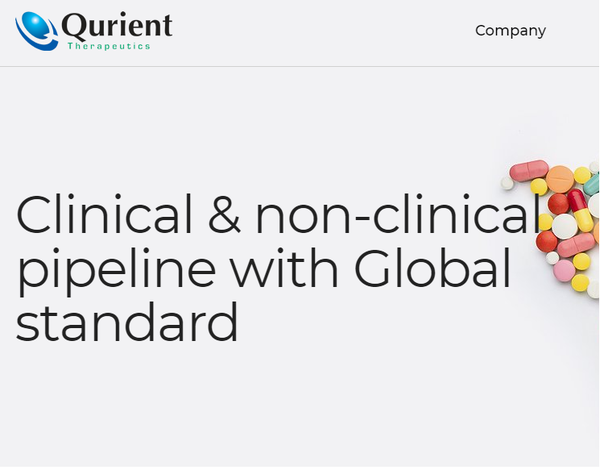Qurient said it entered into a joint development agreement with MSD (Merck in the U.S.) for clinical research on the combination therapy of Q901, a selective CDK7 inhibitor, and MSD’s Keytruda, an anti-programmed cell death protein1 (PD-1) immunotherapy.

Under the accord, the two companies will conduct phase 1 and 2 clinical trials to evaluate the safety and efficacy of Q901 plus Keytruda comobo in the U.S. for certain advanced solid cancer patients.
“We are pleased to partner with MSD to evaluate the combination of Q901 and Keytruda for advanced solid cancer where there is a high unmet medical need,” Qurient CEO Nam Ki-yean said. “The company has confirmed effective tumor growth inhibitory effect of Q901 throughout cell cycle regulation, and expects the induced genomic instability will show the effect of inducing anti-PD-1 immunotherapy and synthetic lethality.”
As the company confirmed the beneficial effect of the combination of Q901 and Keytruda in the preclinical process, the company expects the same effect in phase 1 and 2 clinical trials, Nam added.
Meanwhile, shares of Qurient are currently suspended from trading on the Kosdaq market after the Korea Exchange (KRX) designated the company as a subject for listing eligibility review in May of last year because the firm failed to meet the minimum sales requirement. The KRX granted an improvement period of one year.
The suspension made Qurient the first company to receive a trade suspension order from the KRX among companies that succeeded in entering the Kosdaq through a “special technology listing” system.
The system alleviates certain listing requirements, such as having to satisfy certain profit requirements, for Kosdaq listing applicants based on their technological power and growth potential.
While companies that went public through the special technology listing system are exempt from minimum sales requirements, they must satisfy the minimum sales requirement of 300 million won ($215,594) in a quarter after the grace period ends or face possible delisting from the Kosdaq market.
To resolve the issue, the drugmaker acquired medical supply distribution company H-Pharm last year and recorded 4.3 billion won in sales and an operating loss of 12.2 billion won in the first half of this year.
With the improvement period granted ending last month, the company submitted a report explaining how it has improved its business to KRX on Sept. 7.
The exchange plans to hold a corporate review committee before Oct. 11 to deliberate and decide whether to delist the company.
Industry insiders believe that the KRX will resume trading unless there are special circumstances.
“As Qurient has managed to meet the minimum sales requirement, there is no reason for KRX to delist the company,” said Lee Jun-soo, an analyst for Prophet Asset Management. “Unless the company has other problems unknown to the public, it is highly likely that the KRX will resume trading.”
Related articles
- FDA grants orphan drug designation to Qurient’s ulcer treatment
- Qurient sets up joint firm with Nobel chemistry prize winner
- Qurient enrolls patients for trials of atopy treatment
- Qurient displays immunotherapy candidate at AACR
- Regulator to decide whether to delist Kolon TissueGene, SillaJen, Qurient in October
- Qurient resumes trading on Kosdaq market
- Bio-vaccine fund picks Qurient as 1st investment target

